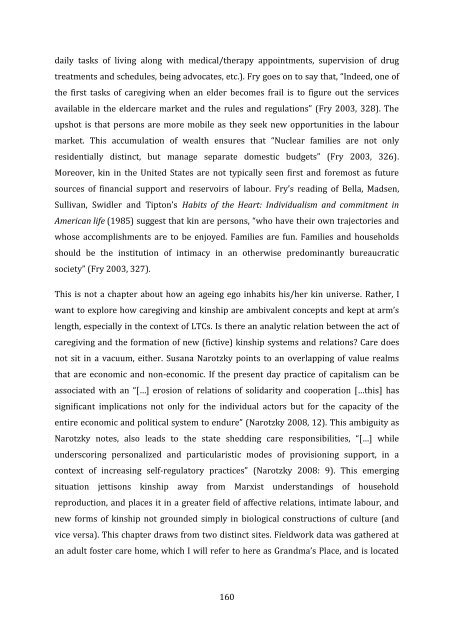Philip Y. Kao PhD thesis - Research@StAndrews:FullText
Philip Y. Kao PhD thesis - Research@StAndrews:FullText
Philip Y. Kao PhD thesis - Research@StAndrews:FullText
You also want an ePaper? Increase the reach of your titles
YUMPU automatically turns print PDFs into web optimized ePapers that Google loves.
daily tasks of living along with medical/therapy appointments, supervision of drug<br />
treatments and schedules, being advocates, etc.). Fry goes on to say that, “Indeed, one of<br />
the first tasks of caregiving when an elder becomes frail is to figure out the services<br />
available in the eldercare market and the rules and regulations” (Fry 2003, 328). The<br />
upshot is that persons are more mobile as they seek new opportunities in the labour<br />
market. This accumulation of wealth ensures that “Nuclear families are not only<br />
residentially distinct, but manage separate domestic budgets” (Fry 2003, 326).<br />
Moreover, kin in the United States are not typically seen first and foremost as future<br />
sources of financial support and reservoirs of labour. Fry’s reading of Bella, Madsen,<br />
Sullivan, Swidler and Tipton’s Habits of the Heart: Individualism and commitment in<br />
American life (1985) suggest that kin are persons, “who have their own trajectories and<br />
whose accomplishments are to be enjoyed. Families are fun. Families and households<br />
should be the institution of intimacy in an otherwise predominantly bureaucratic<br />
society” (Fry 2003, 327).<br />
This is not a chapter about how an ageing ego inhabits his/her kin universe. Rather, I<br />
want to explore how caregiving and kinship are ambivalent concepts and kept at arm’s<br />
length, especially in the context of LTCs. Is there an analytic relation between the act of<br />
caregiving and the formation of new (fictive) kinship systems and relations? Care does<br />
not sit in a vacuum, either. Susana Narotzky points to an overlapping of value realms<br />
that are economic and non-economic. If the present day practice of capitalism can be<br />
associated with an “[…] erosion of relations of solidarity and cooperation […this] has<br />
significant implications not only for the individual actors but for the capacity of the<br />
entire economic and political system to endure” (Narotzky 2008, 12). This ambiguity as<br />
Narotzky notes, also leads to the state shedding care responsibilities, “[…] while<br />
underscoring personalized and particularistic modes of provisioning support, in a<br />
context of increasing self-regulatory practices” (Narotzky 2008: 9). This emerging<br />
situation jettisons kinship away from Marxist understandings of household<br />
reproduction, and places it in a greater field of affective relations, intimate labour, and<br />
new forms of kinship not grounded simply in biological constructions of culture (and<br />
vice versa). This chapter draws from two distinct sites. Fieldwork data was gathered at<br />
an adult foster care home, which I will refer to here as Grandma’s Place, and is located<br />
160
















